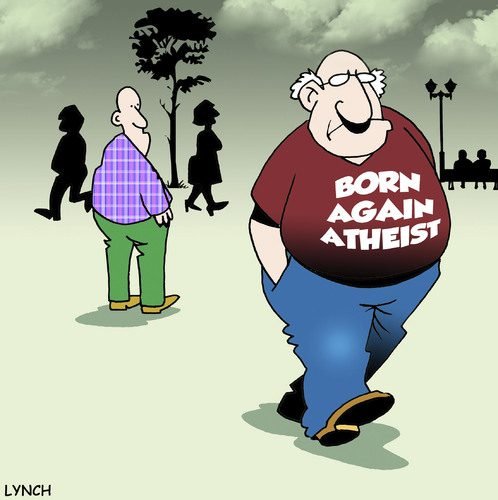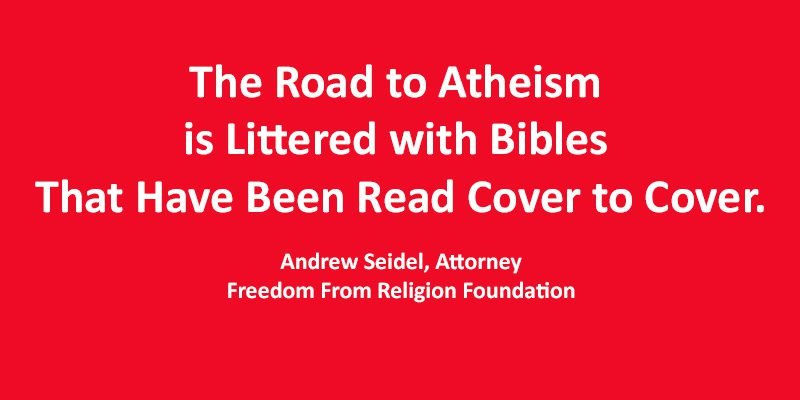
Guest Post by Lon Ostrander
People often ask, how did you go from preacher to atheist. What happened? What caused you to change your mind? Many of us are familiar with the chorus: “I have decided to follow Jesus, I have decided to follow Jesus, No turning back, No turning back.” The song seems to suggest that a U-turn was always a possibility that needed to be constantly and intentionally resisted. There are U-turns and then there are U-turns. For me, it wasn’t like an instant realization that I was heading in the wrong direction and executing a sudden handbrake turn in the middle of Main Street. No, it was more like a huge, gradual, barely discernible arc away from the straight gate and narrow way until I found myself traveling a sparsely trafficked wide road marked by rational thought and naturalistic explanations. Though I hardly noticed, the arc was complete, and six years after leaving the pulpit, I had only to execute an easy and liberating merge onto the Atheist Highway.
Decades earlier, my parents permitted our Pentecostal lady co-pastors to take eight-year-old me to a fire-and-brimstone tent meeting where the thundering music and screaming evangelist had me convinced that Jesus was returning that very night and that the end of my world was upon me. The possibility loomed that I would never get home alive and may never again see my parents and siblings. Well, Jesus didn’t return that night. The rapture did not happen, and I was not left behind. Much to my relief, I even survived long enough for the preacher ladies to get me back home with only minor psychological damage. Well, that’s just my opinion. The preacher ladies happily reported that I had decided to follow Jesus. Well, it was more terror than decision. The seed of doubt was planted that very night but would lie dormant for years.
Later in life came opportunities for repeated salvations, reaffirmations, and total immersions.
I had theological questions but more particularly, eschatological questions. Malevolent eschatology had gotten me into this mess, and I hoped that a better understanding of scriptures would eventually help me make sense of it all. When I began my ministerial studies at the age of forty-one, my concerns only increased. Especially concerning were the words attributed to Jesus as recorded in Matthew 16:28, “I assure you and most solemnly say to you, there are some of those standing here who will not taste death before they see the Son of Man coming in His kingdom” There are similar statements in the other gospels and it looked like Jesus lied, was mistaken, or couldn’t tell time. My quest for understanding eventually led me to discover the preterist movement which essentially teaches that every event associated with the end times, Jesus’ second coming, the tribulation, the resurrection of the dead, the final judgment, had already happened. Jesus’ return to earth was a “spiritual” return and the establishment of the Kingdom of God was likewise spiritual. I had only to check my spiritual rearview mirror to see it. Preterism was briefly satisfying, but as we all know, eschatology is a bitch, and then we die. Atheism ahead. Take the next exit.
In 2007 my secular work took me to Osaka, Japan. Six years before, I had given up the ministry, as ordination of a divorced and remarried matrilineal Jew was just not happening in the Central New York District of the Wesleyan Church. So, I consider myself one of the lucky ones. I was never “caught in the pulpit” as a nonbeliever. My questions and doubts while pastoring were primarily theological and not really an obstacle.
In Japan, Christians are a small minority but while there I attended a local Christian church and found the Christians there to be just as petty and disagreeable as they were back home. The predominantly non-Christian Japanese people were, by contrast, always friendly, polite, and cordial. It was in Japan that I visited a local bookstore and picked up copies of Richard Dawkins’ “God Delusion” and Christopher Hitchens’ “God Is Not Great.” My “spiritual” journey had already taken me to a place of practical deism with brief stops at preterism, liberalism, and universalism. I realized that what little was left of my faith was not only far less toxic, but also entirely without value. It is only a matter of practicality to discard worthless trash. From there merging onto the atheist highway was easy. I was no longer a believer. It was also during my assignment in Japan that my father died. I returned home for the funeral, no longer a believer. I attended my father’s funeral and burial as an atheist, with more anger than empathy for the Christian hopes and fantasies expressed at my father’s funeral service and burial.
Since embracing the atheist and existential nihilist labels, have I ever experienced any doubts? No, never a doubt in my mind. I cannot imagine any scenario that could possibly motivate me to turn back to religious woo of any description.
Do I have any regrets? To borrow a few lines from Ol’ Blue Eyes, “Regrets, I’ve had a few, But then again, too few to mention. I did what I had to do and saw it through without exemption.” Certainly, I regret that I spent more than half of my life believing in a myth as though it were true. I regret the negative church experiences that my family had to endure as they were uprooted from home in New York to experience rather nasty church situations in Georgia, Pennsylvania, and then back home again. Finally, I regret the anguish they experienced coming to grips with the reality that preacher and believer dad was no longer either. Dad had changed his course. Husband had changed his mind.
On the other hand, I am encouraged that we’re seeing it through together. Susan and I just celebrated our forty-fifth anniversary on December ninth. Our sons and their families are very much a part of our lives. Our sons and their step sibs by a previous marriage are all friends. I have made the big U-turn. About religious faith, I have most certainly changed my mind, yet life is good, ever challenging, and much too short.
For five years now, I have had the unique privilege of serving as president of The Clergy Project, our online community of current and former religious professionals who have changed their minds. With the rarest of exceptions, that only prove the rule, we will not be turning back. We are not flip floppers. We are not wavering or vacillating. We have changed our minds, all 1,222 of us, and now we are seeing this thing through together, providing mutual support, community, and hope to each other. We hail from more than fifty countries and include former Christians of all stripes, Jews, Muslims, a Buddhist here and a Hindu there, a couple former Wiccans, a Raelian, a Moonie, and even a Zoroastrian. We dared to question. We dared to examine the evidence. We dared to face the truth, and sooner or later we dared to let others know we have changed our minds. For many of us, coming out as nonbelievers came at great cost, but as Winston Churchill quipped at the end of the movie, Darkest Hour, “Those who never change their minds never change anything.”
Well, that is my story. Twenty-one years after leaving the pulpit, and fifteen years after becoming a born-again atheist, I’m still easing on down that atheist highway. Turning back is not an option. It’s not the “Highway to Hell” (AC/DC), but more like the “Road to Nowhere” (Talking Heads). It is the road travelled and the people we share it with that make it all worthwhile.
Leonard (Lon) Ostrander, born atheist on October 22, 1949, in Elmira, New York, former Wesleyan Pastor 1995-2001, quality assurance representative, current president of The Clergy Project
Bruce Gerencser, 68, lives in rural Northwest Ohio with his wife of 47 years. He and his wife have six grown children and sixteen grandchildren. Bruce pastored Evangelical churches for twenty-five years in Ohio, Texas, and Michigan. Bruce left the ministry in 2005, and in 2008 he left Christianity. Bruce is now a humanist and an atheist.
Your comments are welcome and appreciated. All first-time comments are moderated. Please read the commenting rules before commenting.
You can email Bruce via the Contact Form.


